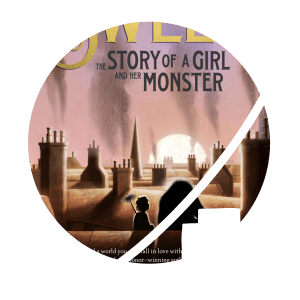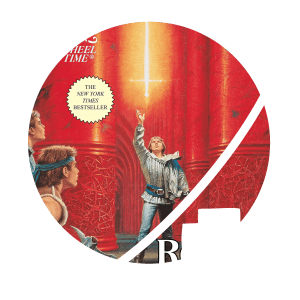Welcome to the Escape Velocity Collection!
We are an opinionated group of friends reviewing all sorts of fantasy and science fiction media. Don’t forget to get to know the curators and visit our curated Collection, where we discuss the stories that never cease to transport us to another world.
Will you escape with us?
LATEST POSTS:
- Video game developed by Failbetter Games
- Directed by Alexis Kennedy
- Published byFailbetter Games
- Published in 2015
- Survival/exploration, Rogue-like, single player
- Playing time: 10-100 hours
- Platforms: Microsoft Windows, MacOS, Linux, PlayStation 4, iOS, Nintendo Switch, Xbox One;
Sunless Sea is a steampunk rogue-like game in which you steer a small ship over the vast procedurally generated Unterzee, encountering islands, port cities, dangerous Zee-creatures and other ships with which to interact. With writing that borders both on horror and on the bizarre, the atmosphere harkens back to the writings of Coleridge and Poe. As you set sail, beware of your supplies running out, but if you return safely to Fallen London, you are sure to be rewarded by the admiralty for your news from distant shores and your reports on the plans of the Khanate.
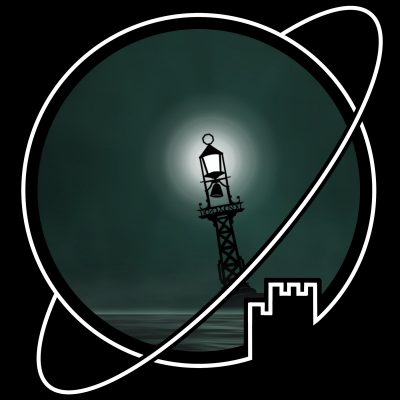

The gameplay of Sunless Sea is rather simple: top down, you view your ship sailing the Zee, steering through the mist toward the islands you see appearing on the edge of your screen. There is combat, but it is limited: you have an indication of your broadside range and a button for ‘fire’, and that’s about it. In port, you can play through quests and interact with shops and officials through simple text and conversation menus with little tidbits of charming art.
Sunless Sea has many elements of a traditional rogue-like game, where you start with very little and are encouraged to slowly build up skills and resources over multiple playthroughs, with each character passing on certain aspects to their successor after their death. Each new character faces a completely new layout of the Zee, though many of the islands and places you’ve seen before will be out there again.
Whilst the game’s atmosphere is amazing and the stories are fun, I found that the game is very slow-paced, causing me to put on a podcast as I was sailing around. I thoroughly enjoyed my first playthrough (though I stranded fuelless somewhere on the dark waters). After the first one, however, I found that I encountered fewer and fewer new islands and stories, while actual progression towards a better ship, a faster engine, or increased skills was painfully slow. I found that I would have rather played the game without constraints, sailing and exploring until I had found everything there was to be seen, than grind my way through the progression system by ferrying passengers or goods back and forth between the same ports for a slight profit ten times.
I want to say that my two-and-a-half star rating here is very personal – I can easily imagine someone else rating this game five stars and I would completely understand. But I am in a position where I like the content in my video games to be more condensed – and Sunless Sea simply does not offer that experience. I did really enjoy the atmosphere during the 10 hours that I played, and I would recommend this game to people looking for a laid-back exploration experience with the time and patience to build your way up through the game’s slow progression system. I’m convinced the developers have hidden some gems of stories behind higher-level places like the Cumean Canal, where stories of The Surface run down into the Unterzee…

Sunless Sea was recommended to me by a friend. I played it for about 18 hours in total, which consisted of three or four ‘playthroughs’. Although there were certainly elements I enjoyed, I found I was somewhat disappointed on the whole.
Like Peter also concisely describes in his review of the game, Sunless Sea’s gameplay is fairly simple, but also very slow-paced. I liked the exploration aspect, travelling through fog to discover new islands and stories, but quickly tired of the resource management that was required of me. Ferrying between the same islands for a tiny profit felt more like a chore than a pleasure. A life of commerce is apparently not for me…
However, after some grinding I was able to obtain a mansion, a will and a faster engine. I experienced some gripping tales – one involving a scary Santa Claus and a melting child, another left me with a Hesperidean Apple, which felt like a worthy achievement? – that were the highlights of my playing time. The storytelling and (cosmic horror) atmosphere of this game are its strong points.
I’m sure I have many stories left to uncover in the Unterzee. However, last time I played, my patience for the endless sailing had run dry. I might pick it up again in the future, though. People who don’t mind a little grinding, might find this game right up their alley.
See also:
- Video game developed by Red Hook Studios
- Directed by Chris Bourassa
- Published by Red Hook Studios
- Published in 2016
- Turn-based dungeon crawler, single player
- Playing time: 100+hours
- Platforms: Microsoft Windows, MacOS, Linux, PlayStation 4, PlayStation Vita, iOS, Nintendo Switch, Xbox One;
Darkest Dungeon is a progression-based role-playing dungeon crawler, in which you recruit and equip teams of heroes to crawl through dungeons where they will encounter turn-based combat, random events, boss battles, hunger, and darkness. Mixing elements of traditional fantasy with the writings of Lovecraft and Poe, the setting has you slowly progress through the story of your decadent ancestor as painstakingly cleanse his manor of the occult corruption that he has left behind. The game is ruthless, so expect your prized heroes to die, for good, especially when you are tempted by the prospects of carrying more loot…
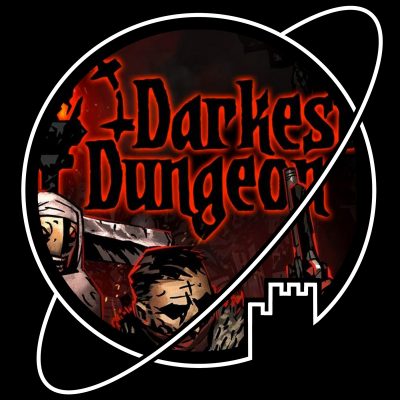

Darkest Dungeon is a great game with a relatively simple core gameplay loop: you recruit heroes, equip and train them, and send them to crawl through a procedurally generated dungeon. When they return (if they return), you can use the loot to upgrade the facilities at your camp and equip more heroes, to send on new and more dangerous missions. The combat is turn-based, with each hero able to perform abilities on the basis of their position in the group, damaging or poisoning enemies, healing or de-stressing your allies, or shuffling your enemies’ positions to get their vulnerable stress casters within range of your bounty hunter’s axe.
Though the gameplay looks simple, it is kept engaging by the large number of different heroes, each with different abilities depending on their position in the line up, and the vast range of enemies with different strengths and weaknesses.
The game’s strength is in its ruthlessness, and in the way it keeps tempting you. The game knows no mercy: dead means dead, and there is no way to resurrect your favourite hero or even reload a save. Things can go downhill very quickly, especially once a hero’s stress meter is maxed and they starts spreading despair to your other characters. A single poor decision can cause a cascade of failures that sees the entire party die or go insane. At the same time, you are constantly tempted to clear another room, or attempt a dungeon in the total dark, increasing difficulty and reward in equal measure.
The only reason I’m not rating this game more highly is because, even though I realise it is literally the point, it can feel a bit disheartening to lose a hero or party as a result of a couple of bad rolls. The game is unfair at times (though that is advertised as a feature), and recuperating from the loss of a prize hero can take a couple of hours. You really do need to be able to stomach painful losses and spend the time to slowly grind your way up to the tough boss battles. I found that after a couple of bad crawls, I didn’t feel like sinking in too much more time – though writing this review has motivated me to pick it back up. Perhaps I’ll clear another dungeon tonight!
Finally, the game’s simple but beautiful art, and absolutely MAGNIFICENT voice acting deserve mention: if ever you are looking for an atmospheric gothic horror game, this is it!
See also:
- Board game developed by Mike Gnade
- Illustrated by Declan Hart
- Published by Rock Manor Games
- Published in 2016
- Deck building card game, 2-5 players
- Playing time: 30m-1h per game
In this steampunk themed tabletop deck-building game, you take control of a corporation, build your deck from lowly clarks and construction workers by recruiting skilled employees and blueprints for powerful airships and useful buildings, and battle your opponents for the ever-diminishing pile of brass in the center of the table!
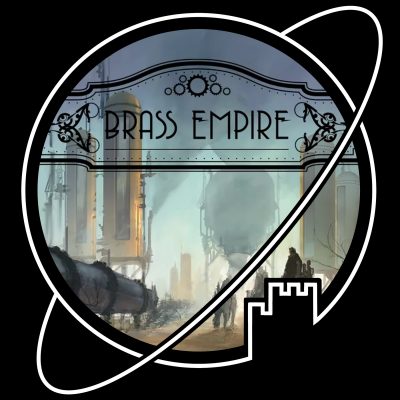

Brass Empire is a relatively straightforward deckbuildinger: you start with a small deck of relatively weak cards. You use them to acquire better cards. After you’ve used your entire deck, you shuffle it and the newly acquired cards together and start drawing it again. As the game goes on and your deck improves, you’ll be able to buy even better cards and buildings to add to your deck. It is then that you start thinking about removing the weaker cards from your deck so you’ll draw the better ones more often. And then, you’ll try to overpower your opponent and destroy their factories by playing tanks and airships, earning brass victory points along the way.
Sometimes when you finish a board game for the first time, your first instinct is to immediately shuffle the cards and try again, because you feel like you learned so much in a single playthrough. Brass Empire is like that. When you first start it all feels complex, but a couple of turns in you start seeing the patterns, and as you upgrade your deck and start drawing your upgraded cards, there is great satisfaction in feeling your power grow. By the end of the game, you’ll be sad that it’s over, but also hyped up to try again and outdo yourself.
The game’s steampunky theme is cool, but the card art, whilst it has cool steampunk inspiration, is very much hit and miss. For example, this game doesn’t look near as good as Scythe, a game with a similar theme.
In addition, while it shouldn’t matter too much for friendly games, I feel the game is not exactly balanced. Two factions stand out: the faction that draws more cards and therefore cycles through the deck quickly and the faction that removes the weaker cards from your deck, makes its smaller, and therefore allows you to get to the stronger cards more often feel a lot stronger than the others.
I enjoyed the game a lot the couple of times that I played it, but I have to admit that I am not very familiar with other games in the genre – I know that Dominion is both the genre originator and a fan favourite, so I’d have to play that one at least to compare. Take what I say with a grain of salt!
See also:
- Book written by Adriaan van Dis
- Published February 2021
- Standalone
Set in a future Netherlands, where the King has been sent packing and the government is controlled by a climate-change denying populist president, this is the story of Jákob Hemmelbahn, son of Hungarian refugees that fled the communist regime, but grew up in the Netherlands. As storm-induced floods wash away the lives and livelihoods of his outcast neighbours, he is dragged out of political apathy and turns to his keyboard to find a way to resist.


Listened to the audiobook with Van Dis himself. Well-read.
Adriaan van Dis is a living giant in Dutch Literature (with a capital L), and to be honest, I never yet liked anything he wrote.
To give you some context, Dutch literature is mostly about: (i) the Second World War; (ii) how colonising Indonesia made Dutch people Sad™; or (iii) sex. Preferably some weird amalgamation of the three, but honestly, mostly sex. If a Dutch literary novel features sex, it will be graphic, plastic, lust- rather than love-driven, will make all those involved Sad™, and will make you feel somewhat like a voyeur for reading it (or, alternatively, Sad™ yourself). Additionally, Dutch literature tends to deify the banality of day-to-day life, seeking endless depth and meaning in people doing really normal things.
With that out of the way, you can imagine none of the reviewers on this website are particularly partial to Dutch literature. Maybe you can also imagine that when Van Dis dropped a book titled ‘KliFi’, my brain short-circuited. I don’t like Van Dis. But there was no way I was not going to read that.
The book is nothing if not surprising. It is an actually quite well-constructed near-future sci-fi dystopia where the Netherlands has 40-degree Celsius summers, hurricanes hit the North Sea, and a populist pretend-intellectual is in charge, claiming climate change is not real, smashing abstract art in museums, and deporting non-ethnic Dutch people by the hundreds. In this bleak world, the main character, Jákob Hemmelbahn, a child of refugee parents, witnesses a flood that sweeps away a settlement of illegal residents in a river’s floodplains. The government’s response is to cover up the damage and deport the residents – and Jákob wants to act. Van Dis, being a writer himself, figures that this character’s urge to do something is best translated into … writing a book about it. So we follow along as Jákob sets to writing, struggling with his inner demons, balancing between telling the truth and his book passing the test of the censors.
The book shares some of the pitfalls of other Dutch literature – notably the completely unnecessary horniness of (and towards) its 84-year-old protagonist and the absolute worship of the supposedly ‘normal’ survivors of the flood. But if you can overlook those quirks, it is an interesting take on the cli-fi genre, a warning against apathy in the face of climate denial and populism, a vivid picture of a Netherlands-that-could-be, and a nicely manageable piece of well-constructed prose. It is not the Netherlands’ 1984, but I can imagine it becoming a staple of Dutch literature classes in the future.
It has only appeared it Dutch so far, but for our Dutch readers, it is an easy recommendation because it is only about 200 pages long – an easy way to venture a few careful steps out of our comfort zones, a way to get our more literary focussed friends and family to try a different genre, and an interesting conversation starter at worst.

When we started this website, I never would have thought we would end up reviewing a book by Adriaan van Dis in this genre. As Peter explained, he is a famous name in Dutch literature, and absolutely not one I would associate with either fantasy or science fiction. Perhaps that is why this book felt so strange to me: it has the tone of the Dutch classics that I remember having to read in high school, but it’s themes are those of today. Climate change, xenophobia, refugees and the rise of populism all take central stage. While this might sound like an interesting recipe for a book, sadly I found I did not love it. I did not hate it either, mainly because it is so short that by the time you grow tired of it, you’ve already finished it.
The main character Jákob is not particularly likable. He spends most of the book being very angry about everything that is happening, and yet somehow I never got the feeling that his outrage resulted from a place of true empathy towards the refugees. His ‘activism’ felt mostly like the equivalent of someone posting angry and self-righteous comments on Twitter. On the whole, there just were not enough elements that really pulled me into the book, and so I found it hard to care very deeply about what was happening. While the book brought up some really important issues, it did not deal with them in a way that felt particularly new or inspiring to me. However, for people who are fans of Adriaan van Dis but are less familiar with dystopian fiction, this book might be a good introduction to these themes.
See also:
- Video game developed by Wormwood Studios
- Directed by Mark Yohalem
- Published by Wadjet Eye Games
- Published in 2012
- Point-and-click adventure
- Playing time: 6-8 hours
- Platforms: Microsoft Windows, MacOS, Linux, iOS
Primordia is a beautiful and atmospheric point-and-click-game, following the story of Horatio Nullbuilt, an android living in a crashed ship in the desert wasteland, who has his life turned upside down when a hostile robot steals his ship’s power core. Horatio is determined to scavenge the post-apocalyptic wasteland for a new core, but Crispin, his self-built sidekick, suggests that perhaps it would be easier to find one in Metropol, the city of glass and light…
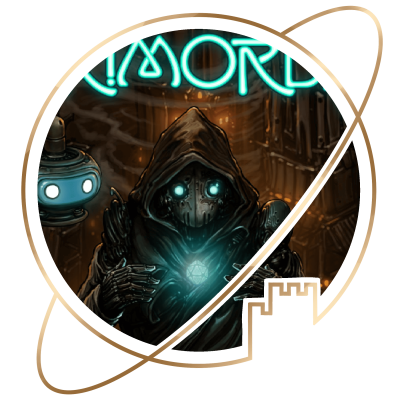

One would think that if there is one genre of video game that is well past its prime, it is the point-and-click adventure. Until a couple of years ago, I would’ve guessed that nobody would still be making them. I now know that that’s not true – and that great point-and-click games are still being created today.
One example is Primordia. It is 100% a classic point-and-click game. The gameplay is as you’d expect: your character travels a post-apocalyptic landscape consisting of detailed single screen environments, and interacts with the world by clicking on the objects and characters he encounters there. You progress through the game via a set of simple logic puzzles that require you to find things, fix things, bring characters certain objects, and answer questions. Most of the puzzles are easy enough to solve, but some are a bit trickier. Like any point-and-click game, you’ll find yourself endlessly clicking elements of the world to see if they come loose, and whenever you add a new object to your inventory, you’ll want to go back to earlier screens to see if it can be useful there. Like any point-and-click game, there are moments where the gameplay devolves into a rather cynical ‘rub x on y’, to see if anything happens. Luckily, the game allows you to ask Crispin for hints, and none of the puzzles seemed unfair in hindsight – though trying to speed through it in one sitting is bound to become frustrating. Every now and then, a eureka moment is required – I initially played with a friend, and I remember calling him while cycling home to ask if he could try looking in that one spot because I thought we might have missed that… and bingo! I love the game for those moments: it offers simple, laid back, but quality gameplay that can also be fun to share.
The game’s primary appeal, however, is its aesthetic. The world is built up out of beautifully drawn environments and great pixel art characters and objects. Primordia has a great atmospheric soundtrack, sucking you into the world. I find myself still listening to it from time to time when I want something relaxing on in the background. The voice acting is also great, especially the little conversations between Horatio and Crispin. Little elements like those forge a surprisingly deep bond between the player and the characters for how simple the game is.
The point-and-click experience is not for everyone. However, this style of game is also especially well-suited to people that don’t like the flashy speed of modern gaming, people that don’t consider themselves ‘gamers’, but might be interested in a stress-free interactive puzzling experience with great characters and art. My parents, for example, loved playing Primordia together.
Overall, Primordia is near the top of my list of favourite games, which I think is a wonderful achievement for such a simple game that can be picked up for less than ten euros.
To give you one tip for your playthrough: when in doubt – plasma torch.

Peter just couldn’t stop pestering me about this game, recommending it at every opportunity he got. It was only a matter of time before I would succumb. And I’m grateful for his perseverance.
Primordia is a fairly simple point-and-click puzzle game, embellished with atmospheric music and pixel art. It transports us to a post-apocalyptic world in which humans have made way for their robot inventions. As a player, you control Horation Nullbuilt, an android scavenger living in a stranded airship with his own robot companion.
Horatio, having a gruff voice but (depending on your choices) soft-hearted demeanor, reminded me a lot of Geralt of Rivia. This made it easy for me to like him and get invested in his story and the world he lived in, which both have a lot more depth to them than at first appeared. At times grim and sad, but also full of light-hearted moments and silly humor. It’s impressive how – in both its storytelling and worldbuilding – Primordia is extremely efficient, only using the bare minimum to craft a fulfilling narrative. And if that’s not enough, there are also multiple endings available, dependent on choices you make throughout the game.
The puzzles in this game can be challenging at times, but if you let the wheels in your head turn long enough, it’s unlikely you’ll never beat them, one way or another. If I were to give a hint, it would be the heads-up that the map in your data pouch can be used for fast travelling. I only discovered this helpful mechanic quite late…
I won’t pester you to play this game, but honestly? You would deserve it.
See also:
Tagged:
- Video game developed by BioWare/Black Island/Overhaul Games
- Directed by James Ohlen/Trent Oster
- Published by Interplay Entertainment/Atari Inc.
- Published in 1998/2012
- Top-down role playing game, single player and online multiplayer
- Playing time: 40-100 hours
- Platforms: Microsoft Windows, MacOS, Linux, PlayStation 4, Android, iOS, Nintendo Switch, Xbox One
BioWare’s classic role-playing game Baldur’s Gate is the giant on the shoulders of which the modern action RPGs of the genre stand. Though the original dates to 1998, the 2012 remake makes the game accessible to modern players – and though the top-down isometric style may be out of vogue today and the combat system somewhat slow and complicated by modern standards, the story, style and progression hold up, especially for players familiar with Dungeons & Dragons or similar tabletop RPGs.
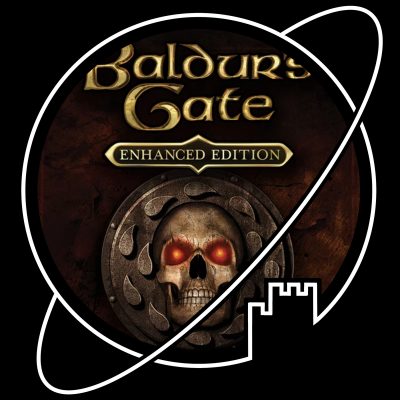

I have to admit something about Baldur’s Gate: the classic 1998 6-CD-ROMs-in-one-box version of the game was one of my very first ventures into the high fantasy genre. I distinctly remember sitting on my father’s lap (I was literally that young) building a character. I designed a dwarven fighter. I remember spawning outside Winthrop’s Inn, just with a quarterstaff, and walking around Candlekeep. I made my father read and translate all the flavour text, and I remember him trying to convince me to sell the Lynx Eye Gem Phlydia gave me after returning her book, but refusing, because the flavour text said dwarves liked gems (“but it said they like gold too!”). The game, its world, the possibilities, they completely blew me away – and I never even left Candlekeep. It took me a fair few years before I was old enough to actually play the game, but I think it would be fair to say that with the memories I have of this game, I cannot be entirely objective.
Baldur’s Gate is a top down roleplaying game, with relatively simple isometric graphics and limited voice acting, consisting of a great number of separate map areas (ranging from towns to dungeons to mountain fortresses and rocky coasts) that can each be explored with a party of the player character and up to five companions. Movement and combat appear to take place in real time, but (astonishingly) follow the turn-based rules of the tabletop RPG Dungeons & Dragons, down to weapon damage being indicated in dice (for example, 1D6+2, or 2D4, referencing 6- or 4-sided dice). Interactions with NPC take place through text menus with (often extensive) dialogue options. The setting is a relatively standard medieval high-fantasy setting, taken from the Forgotten Realms campaigns produced by Wizards of the Coast themselves.
Baldur’s Gate is a bizarre game. The D&D rules system, though allowing for a breadth of possibilities, is positively arcane for people not already familiar with it. The interface is manageable but far from streamlined. The graphics are simple. The combat can be tense but has you looking at a freaking scroll of text displaying dice rolls in the bottom of your screen more than at the actual characters fighting. Trying to describe it, it seems almost unimaginable that anyone would want to play it.
Yet, if you do know (some) D&D, and want a video game experience with a cool story, mysteries to unravel, in-depth character creation and progression, and a more laid-back style closer to a strategy game in controls, Baldur’s Gate is perfect for you. It is a way to scratch your D&D itch if your session’s been canceled. A way to get a taste of what D&D can be like if you’ve yet to find a group. A roleplaying game that does not rely on actions per minute or reflexes for your character to be a hero. A bath of nostalgia for some people.
I realise Baldur’s Gate might not be for everyone, and especially not for people used to more flashy, fast paced games that are the standard in the 2020s. But if you want a taste of what fantasy gaming was like in the last century, there is no better place to look than Baldur’s Gate.
The Enhanced Edition updates graphics, (mercifully) abolishes the need to switch CDs when entering every other map, and updates the rules system from the relic AD&D2E to the slightly simpler and more widely known D&D3.5E, and features a handful of quality of life improvements to the gameplay and the interface, but changes the game very little at its core – a new player seeking to take the plunge would do very well to buy the later edition.
See also:
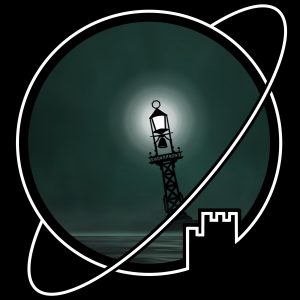
Review: Sunless Sea – Failbetter Games
Sunless Sea is a steampunk rogue-like with elements that harken back to the writings of Coleridge and Poe, in which you sail your dapper vessel across the vastness of the underground Unterzee in search of riches and fame.
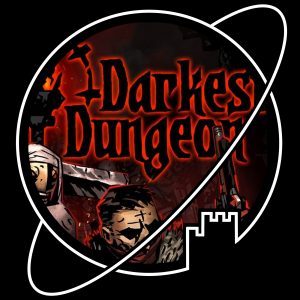
Review: Darkest Dungeon – Red Hook Studios
Darkest Dungeon is a ruthless progression-based role-playing dungeon crawler, mixing elements of traditional fantasy with the writings of Lovecraft and Poe in a merciless grind through the manor of your ancestor.
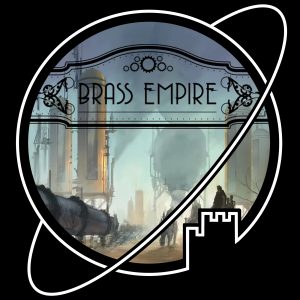
Review: Brass Empire – Rock Manor Games
This steampunk-themed deck builder sees players compete for the services of the best employees and the most powerful blueprints in a battle for the pile of brass coins in the centre!

Review: KliFi – Adriaan van Dis
In a future Netherlands, the government is controlled by climate denying populists, and Jákob Hemmelbahn witnesses the result of the government’s negligence when a storm washes away the houses of the less fortunate.

Review: Primordia – Wormwood Studios
Primordia is an atmospheric point-and-click-game that follows the journey of the android Horatio Nullbuilt and his sidekick Crispin across a post-apocalyptic wasteland following the theft of their ship’s power core.
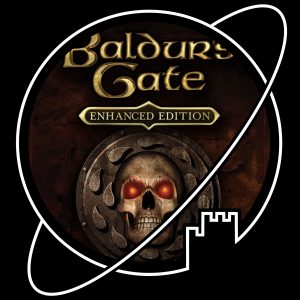
Review: Baldur’s Gate/Baldur’s Gate: Enhanced Edition – BioWare
BioWare’s classic role-playing game Baldur’s Gate, which came out in 1998, is one of the games that laid the groundwork for the rich fantasy gaming environment that we are privileged to experience today.









